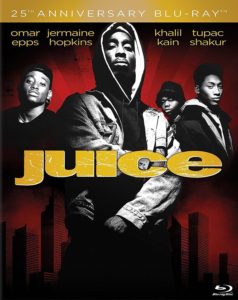Black Wings (PBS Distribution)
For early aviators, conquering the forces of gravity was a daunting challenge. But black aviators had an additional challenge: to conquer the forces of racism.

Meet the men and women of color who took to the skies throughout the 20th century and helped prove to a segregated nation that skin color didn’t determine skill level. From biplanes to commercial jets, and from barnstormers to war fighters, meet the path-breaking pilots who opened the skies for all.
In the firmament of rock ‘n’ roll’s first-generation creators, no artist looms larger than Chuck Berry. In a consistently innovative recording career that spanned more than 60 years, the iconic singer-songwriter-guitarist, who passed away on March 18, 2017, laid much of the groundwork for modern rock ‘n’ roll, while creating some of rock’s most distinctive and enduring anthems, including “Johnny B. Goode”, “Roll Over Beethoven,”, “Rock and Roll Music” and “Reelin and Rockin”.
Geffen/UMe are paying tribute to the immortal spirit of Chuck Berry with the ultimate vinyl version of his landmark greatest hits compilation, The Great Twenty-Eight, with The Great Twenty-Eight: Super Deluxe Edition.
The five-disc vinyl box set housed in a textured box, complements the original two-LP, 28-song compilation with an additional LP, More Great Chuck Berry, containing 14 more hits, rarities and B-sides missing from the original, as well as a rare live album, Oh Yeah! Live in Detroit, available on vinyl for the first time. The collection also include a newly created bonus ten-inch EP Berry Christmas, featuring four holiday-themed classics on “Rudolph-Red” vinyl, with one song on vinyl for the first time as well. A limited edition version on “Chess Blue” vinyl, limited to 500 copies.
Bob Dylan once called Berry “the Shakespeare of rock ‘n’ roll.” John Lennon stated, “If you tried to give rock ‘n’ roll another name, you might call it ‘Chuck Berry.'” As Keith Richards writes in the booklet intro, “Chuck Berry is the gentleman who started it all.”
And if those testimonials aren’t convincing enough, one listen to The Great Twenty-Eight: Super Deluxe Edition will make the case for Chuck Berry’s singular, timeless rock ‘n’ roll brilliance.
Cruel and Unusual, a profound documentary telling the story of three men—Robert King, Herman Wallace and Albert Woodfox, known as the Angola 3. Wrongfully convicted for murdering a prison guard in 1972 at the Louisiana State Penitentiary, these men have spent longer in solitary than any other prisoners in the US. On his release, Albert Woodfox had spent 43 years in a six foot by nine foot cell for a crime he did not commit.

The film is available for sale and rental on Amazon Video, iTunes, and Vudu, as well as DVD and Blu-ray.
Told in detail by interviews and prison phone calls from King, Wallace and Woodfox, Cruel and Unusual allows viewers to experience these men’s pain and anguish. From the worst of the worst in their cells, these men managed to find the best of the best that the human spirit has to offer. They have fought for justice and never accepted defeat so that no one else will ever suffer the way they did. A call to action, the film aims to support the growing campaign to end the overuse of long term solitary confinement in America’s prisons.
The rich history of America’s Historically Black Colleges and Universities (HBCUs) began before the end of slavery, flourished in the 20th century, and profoundly influenced the course of the nation for over 150 years—yet remains largely unknown. This latest documentary from Stanley Nelson, America’s foremost film chronicler of the African American experience, is the powerful story of the rise, influence, and evolution of HBCUs come to life.
The story is told in Tell Them We Are Rising: The Story of Black Colleges and Universities (PBS Distribution).
A haven for Black intellectuals, artists, and revolutionaries—and a path of promise toward the American dream—HBCUs have educated the architects of freedom movements and cultivated leaders in every field while remaining unapologetically Black for more than 150 years. These institutions have nurtured some of the most influential Americans of our time, from Booker T. Washington to Martin Luther King, Jr., W.E.B. Du Bois to Ralph Ellison, Toni Morrison to Oprah Winfrey, Alice Walker to Spike Lee to Common.

 Paramount is pushing the power of Juice. A powerful morality tale steeped in ’90s urban culture, Juice marked the feature directorial debut of Spike Lee’s acclaimed cinematographer Ernest R. Dickerson and the first starring roles for Omar Epps and an electrifying Tupac Shakur.
Paramount is pushing the power of Juice. A powerful morality tale steeped in ’90s urban culture, Juice marked the feature directorial debut of Spike Lee’s acclaimed cinematographer Ernest R. Dickerson and the first starring roles for Omar Epps and an electrifying Tupac Shakur.